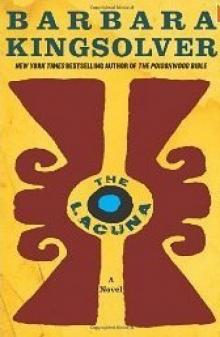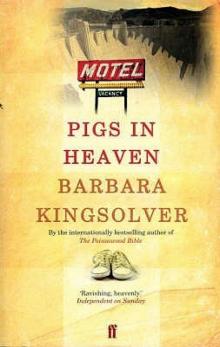- Home
- Barbara Kingsolver
The Lacuna Page 16
The Lacuna Read online
Page 16
This week is too hot for early spring. And this week the household staff are banned from the front of the house due to the government officials negotiating there, late into the night. The heat in this bricked-up cloister is unbearable. Van is dismayed at being held out of the meetings, but Diego says it's sensitive. President Cardenas is expected here himself, to help arrange the Commission of Inquiry for Lev.
After cooking and serving supper, washing up, tidying, and sweeping, nothing is left for the staff but to sit on cots in these tiny rooms in undershorts and gob shirts, smoking panatelas, telling exaggerated stories to pass the time. It's like being at school. These are not brotherly feelings Van inspires. Mother would say: Van is plenty rugged.
March 3
The guards spend every long evening all in one small room, breathing the same exhaled air and drinking one another's spit from one warm jug of pulque. Playing cards for pesos, boredom games. Earlier this evening, the usual one: name your one wish if you could have it, then die tomorrow. Boys at school played this, reliably coming round to getting hands on some celebrated pair of tetas. Van from his high place added to the earnest list, "success of the Commissar's revolution." He was on the cot and everyone else on the floor, passing the cigarette packet. "You, Shepherd. Name yours."
"To make something beautiful, that people would find very moving."
"Pendejo, you do that every day in the kitchen."
"I mean a work of art that isn't in the toilet pot by the next day. A story, or something like that."
"Like the murals of Rivera, commanding men to rise from their knees and fight!" Lorenzo said. Stewed or not, loyal to the cause.
"Or smaller, like the paintings she does. Something people would find...dear."
"Querido. That's all you want, sheepdog!"
"Our shepherd," Van said, leaning out to pat a shaggy head as if it belonged to his dog. In front of the other men. The small dog panted.
10 March
A wire from Mr. Novack, now back in New York: he has persuaded Professor John Dewey to chair the commission of inquiry. Some American journalists will follow the story to Mexico. Diego and Lev are extremely happy, as it will give Lev opportunity to answer Stalin's charges, for the world to hear.
Noted: That Sra. Frida, after inspecting last week's record of events, repeats her request that it remain objective, especially with regard to the secretary Van.
April 6
Professor John Dewey of Columbia University arrived today by train from New York. He will preside over the joint Commission of Inquiry into the Charges Made Against Lev Davidovich Trotsky in the Moscow Trials. He and seven journalists will reside for the month at the San Angel Inn. The opening press conference will be there, honoring Professor Dewey's wish for fairness and no contact with the defendant prior to hearings.
The proceedings will be held here, because of special needs for Lev's security. The attorney for Lev's defense, Mr. Goldman from Chicago, arrives by train tomorrow. Sandbags are being laid across Londres to close the neighborhood to traffic. Extreme publicity is expected during the trial. The Mexico City newspapers are already having a run of extras on the subject of the Villain in Our Midst.
April 10: First Session of the Joint Commission of Inquiry
Professor Dewey opened. Thanked Mexican government for its political democracy, stated no man should be condemned without a chance to defend himself. "I have devoted my life to the business of enlightening minds, in the interest of society. I accept my responsibilities in this commission for one reason: to do otherwise would be false to my life's work." The responsibility is to investigate charges of sabotage and sedition brought by Stalin against the defendant.
Defendant is Lev Davidovich Trotsky, b. 1879. Fought as anti-tsarist from age seventeen, led the Bolshevik Revolution, elected president of the Petrograd Soviet in 1917. Author of the manifesto of the Third International Comintern, 1919. Expelled from the Soviet Communist Party in 1927. Forced into exile in Kazakhstan at that time.
At the table with the defendant are his wife, his lawyer, and Van, who has the job of producing requested documents. At a table near it, two Americans and HS, who are to translate and record all questions posed to Lev, and his answers. A man named Glotzer (American) is official court reporter and knows a language (shorthand) that allows writing everything very fast, but only if he understands the words. So all proceedings go to English for his sake, and of course for Professor Dewey's. Therefore HS has the duty to record and translate any questions asked or answered in Spanish.
None today, only testimony. Cross-examination begins tomorrow.
12 April
One question in Spanish today, from Sr. Ponton of the Sociedad de Naciones, translated as follows: "Sir, for our Mexican correspondents I beg you the trouble of answering: your persistent charge against Stalin is a lack of democracy. Is that correct?"
Lev answered: "Correct. A rank of party workers has been created who enter the government and renounce their own opinions. Or at least any open expression of them. Every page on their desks comes from above. They behave as if the hierarchy had already created all party opinion and decisions. From this hierarchy, every decision affecting the country stands in the form of a command."
When Lev isn't speaking he puts his feet on the table and leans back in his chair. Today he reached such an extreme backward angle, it seemed the GPU might not be needed to crack the man's head. But he was still listening. He looks down his Russian nose and his whole lower face crumples into his collar when he concentrates. He has no consciousness of how he must look to others, only aiming his mind with such a ferocious focus that it could set all those bureaucrats' papers to flames. This must be the countenance of a revolutionary.
This daily record complete and submitted: 4/12/37.
13 April
Sr. Ponton's question and Lev's answer have gone on the front page of today's Washington Post! Exactly as translated by HS, and quoted again on the editor's page, in a discussion of the Moscow Trials and the commission. The article even used the description of Mr. Trotsky leaning in his chair, and the headline in very bold letters was: THE COUNTENANCE OF A REVOLUTIONARY.
These were only some notes and doodles submitted with the translation transcript, Sra. Frida. This is a shock, and a terror. The very first try at translation, and some notes jotted on a whim, now on display for the world to read? It was hard to think about breakfast this morning. Perpetua said, "Sit down and stop shaking, mi'ijo. It's a bad start to the week for a man who's hanged on Monday."
Hanging is what it feels like! A twenty-year-old galopino who knows nothing about politics could have mistaken yes for no, a renunciar for a renacer, and then what? History could hang on it. Lives could be lost, for the sake of a wrong word. No wonder writers are pessimistic. Better to be a cook, where a mistake will only send someone away hungry, or at worst, to the WC.
But Van complimented the translation. He read the article to Lev and Natalya at breakfast, translating it back to Russian as he went. They listened to the words of a cook, while eating toasted bread for which the same nervous cook had already burned his knuckles.
14 April
After the day's hearings closed today, Lev went to the front door to see the huge crowd gathered there. Not only newsmen but workers of all sorts, even laundrywomen. No barefoot soldiers want to kill him anymore, after hearing his fiery defense of the worker and peasant reported in the news. Now he's afraid they'll want to knock Jesus off the pallets of the Holy Week processions this week and put Trotsky up there instead. A group from the miners' syndicate walked here all the way from Michoacan.
He spoke to the crowd in Spanish, slowly but well. "I am here because your country believes with me in democratic government and the worker-control of industry. Our efforts cannot succeed in an empty space." (Probably he meant "a vacuum.") "True change will come from an international organization of workers for world revolution." The crowd has been quiet all day, but at those words they roared.
Nearly every day he takes small pauses from his writing to practice Spanish with the native typist. Van doesn't like the distraction, pointing out that translators are always at the ready. And Lev says, "Trust an old revolutionary to trust no one completely." He was teasing, it seemed. But today as he spoke directly to the crowd, his purpose was clear.
15 April
A long day of hearings. Mr. Dewey says it's nearly concluded, but the crowd still grows, both the number of foreigners inside and the Mexicans outside. Lev has such a passion for this hearing, he wouldn't mind if it went on until the sun burned cold. Van seems content beside his chief, undaunted by the army of observers: Mexican and foreign reporters in fedoras and rolled-up shirtsleeves, magazine writers, even some novelists, watching Van's every move as he fishes into the paper caverns of the files with his long fingers, retrieving whatever obscure page Lev might need, indicated only by a word, a date, or a person's name. They are like father and son. Lev and Van.
Very few questions in Spanish today. Sr. Ponton of the Sociedad de Naciones has the most. Today he had two. The first: "Sir, is it your position that a worker's state could genuinely honor suffrage and all democratic rights, as in a social democracy?"
Lev's reply: "Why should it not be so? Even now, in all the capitalist countries, Communists take part in the parliamentary struggle. When we achieve a worker's state, there is no difference in principle in the way we will use suffrage, freedom of the press, assembly, and so forth."
Second question: "Sir, you say the Soviet Union under Stalin is a degenerated workers' state, controlled by an undemocratic bureaucracy. You predict this corruption will be overthrown by a political revolution, establishing a democracy of the working class. Or that it will continue to degenerate under world pressure into a purely capitalist state. In either case, can you rationalize the costs to society?"
Lev answered: "Young man, you make a point. Humanity has never succeeded in rationalizing its history. Much harm comes from leaders who insist that for every advance, someone else must slide backward. The dictatorship of the Soviet Secretariat came about because of the backwardness and isolation of the country, for so long imposed on us by the tsar. We were accustomed to the rationalizing of a despot. People accept what they have already known. When mankind is exhausted, he creates new enemies, new religions. Our best task is to move forward without seeking to do so."
April 17
The commission has ended its work after thirteen sessions. If it went another day, the dining room of this house would crack like an egg. Lev closed with his usual vigor: "The experience of my life has not destroyed my faith in the clear, bright future of mankind. At age eighteen I entered the workers' quarters of Nikolayev with nothing but a boy's belief in reason, truth, and human solidarity. My faith since then has become more mature, but no less ardent."
Every hand stopped; the reporters looked as if they might need handkerchiefs. Mr. Dewey said, "Sirs, anything I could say after that would be a waste of breath."
Mr. Dewey and colleagues will consider the evidence and find the defendant guilty or not guilty. They will take many weeks before releasing their written verdict. But Lev is jubilant. Before the world, he has answered the charges.
28 April
The house is calming to the previous routines. If "calm" describes a man who works like three, signaling the typist to finish a letter and bring a book while he dictates political theories into the microphone of the wax-cylinder recording machine. It's very warm, even working in shirtsleeves. Van is always last to remove his tweed jacket. An unexpected brush of his hand, when he reaches for a book, feels like boiling water. Van and Lev are both men of northern temperaments, yet Van seems agitated by Mexico's vivid sun and landscapes, while Lev seems enlivened. He even loves the cactus.
1 May
Sra. Frida has continued her daily visits here since the hearings ended, making sure Lev is content. Let it be noted here: bringing Fulang Chang "to cheer the place up" may not be helpful. Natalya despises the monkey and yesterday, while Sra. Frida was in the kitchen, gave him a whack on the skull with a Conservative Party newspaper.
Lev is energized by the news of the workers' uprising in Barcelona, citing it as a sign that the Third International agreement between Stalin and the world's other communist parties has collapsed. Lev has been asked to write a fourth set of Internationalist agreements, hence his frenetic rush of words congealed into wax cylinders from his Ediphone. The alternative to Stalin's Comintern now sits in jars on the desk, waiting to be transformed into typewritten words, and then the actions of men.
To celebrate, the household staff is complying with Sra. Frida's requests to prepare for her "Fourth International party." Sr. Rivera is more worried about security than table decoration.
2 May: The Dance
Lev was already in his study when Sra. Frida arrived this morning to take over the dining room, before Natalya had eaten her breakfast. So she ate in the kitchen. Begging pardon, but please let it be noted: this is Natalya's only home. Lately she has mentioned feeling like an unwanted guest.
Begging a second pardon, senora, but it was impossible not to laugh at the sight of you standing there at the table, decorating it for the party, with red carnations in both hands and one in your mouth. You looked like Carmen.
What are you laughing at? You think it's so simple to create history? Long skirt sweeping the floor like a broom, moving around the table, carefully laying out the long-stemmed carnations on the white tablecloth. The pattern looked like a huge eye, the long stems as eyelashes radiating outward like rays of the sun.
It's true, dining tables are part of history. The Painter's walls and Lev's wax cylinders are not the whole story. The Sra. frowned, already picking up the flowers again before the design was finished. Commanding: Fetch the scissors! without even looking up. Snipping the heads of the carnations from their stems, working so quickly that trails of blood might have begun flowing from her fingertips, like one of her paintings.
Then she put a hand on her hip and held up the scissors, menacing the air. "We're going to have dancing tonight. A lot of handsome artists. Belen and Carmen Alba told me you dance the sandunga and jarabe, perfectly. I will not even ask how they know this. But how did you learn?"
"From my mother."
"Your mother, a nationalist? I had a different impression."
"She would deny it now. She had a flirtation with it when we first came to the city. But now she's moved on to the age of swing, and well-paid engineers."
"And do you renounce us also? Or would you dance with an Indian girl?" She held out her hand and moved like liquid, rolling herself up into the arm that received her, making a flirtatious snip with her scissor like a flamenca dancer with her castanet.
Senora Frida is a confusion of terms: sometimes like a stern little man, then suddenly a woman or a child, but in every form demanding that you remain in love with her. Commanding even her giant of a husband, until he runs off to be rescued by softer, pillowy women. This is the truth and not an opinion: her cat smile, those hands, the paintbrushes. Any one of them can be like a slap across the chest.
After an hour's work she was satisfied with the arrangement of red flowers on white linen. "Here will be Lev's place," she said quietly, "and here. Natalya's." Uttering that second name as if her place at the table were a concession.
Jealous, of Natalya? Frida, is it possible?
It's a lot of work to use flowers as paints. By the time the party ends, they'll be a mess of wilted petals. Stains on your white tablecloth that could have been prevented. But you whirled around at that suggestion, looking fierce: lips pursed, the hand on your red rebozo, those silver earrings caressing your shoulders like hands.
"Unnecessary stains and dead flowers! Soli, excuse me but what else do I have for making my marks on life, if not lo absurdo y lo fugar."
You wanted to know how to say that in English. "The absurd" is easy. The other is more difficult. Fugar means things that
run away with time. What would we do without the absurd and the running away?
That was the moment when the door flew open bang! and of course it was Diego. Carrying books and jacket, dropping things as he went, his boots hitting the tiles like cracks from a rifle as he crossed the room, kissed you, took the flowers away, and began to rearrange everything. All your work, you, everyone in the room--it all vanishes in the presence of Diego. Always right, because he is always riveting. For La Frida there is El Diego and nothing else.
A long time ago at school there was a boy like that, Bull's Eye, always right even when he was wrong. Once you said it would be necessary to confide in you, Frida, sooner or later, one pierced soul to another. That maybe you could help. Since you are the only one reading this report each week, here is the confession you requested: the scandal of irregular conduct. For the Insolito there was Bull's Eye and nothing else. Insolito means ridiculous. It means all those things you said, absurd and running away. Where would you be without lo absurdo y lo fugar. Maybe you're also lonely in this house, and you were asking: My friend, what would I do without you?
16 May
The press reports that Mr. Browder of the American Communist Party has come here to warn Mexican Communists against any communication with Trotsky. He says "unity at all costs" means supporting Stalin. Lombardo Toledano and many other Mexican party leaders have dined at the Riveras' table, eaten the food of this kitchen. But Diego's membership in their party is now revoked. They all ignore his invitations to come here and meet with Lev.
The heat is unbearable. Van goes out to a bar at night, the Golden Earring, just to get some air, he says. Lorenzo goes along, hoping to meet girls. Do you want to come too? Van asked. But probably the bar would be just another airless place.
1 June
The commander in chief of the Red Army, executed for treason. Tukhachevsky had expressed support of Trotsky's position, and for this reason only he is dead. Lev dreads there will be a purge, thousands of officers affected. Nothing else here to report.

 Prodigal Summer: A Novel
Prodigal Summer: A Novel Animal Dreams: A Novel
Animal Dreams: A Novel The Poisonwood Bible
The Poisonwood Bible High Tide in Tucson
High Tide in Tucson The Lacuna
The Lacuna The Bean Trees
The Bean Trees Animal, Vegetable, Miracle: A Year of Food Life
Animal, Vegetable, Miracle: A Year of Food Life Pigs in Heaven
Pigs in Heaven Small Wonder
Small Wonder Flight Behavior
Flight Behavior Homeland and Other Stories
Homeland and Other Stories How to Fly (In Ten Thousand Easy Lessons)
How to Fly (In Ten Thousand Easy Lessons) Unsheltered
Unsheltered Animal Dreams
Animal Dreams Prodigal Summer
Prodigal Summer Animal, Vegetable, Miracle
Animal, Vegetable, Miracle